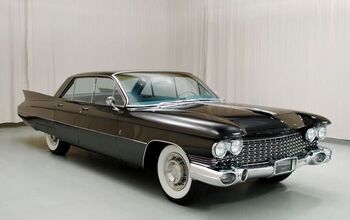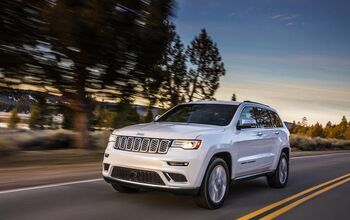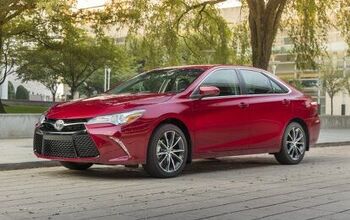Mergers Don't Make Better Cars

Mergers don’t excite me.
I’m not excited about the prospect of walking in to my neighborhood Jeep/Chevy/Buick/Dodge/GMC superstore and thumbing through the soul-less car stocks like a weekend trip to Costco.
Bark makes a good business case that Mazda and Subaru could help each other in worldwide sales, and brings up some interesting short-term mashups: rotary engines with all-wheel drive, a boxer in a Miata, et al. All those things sound fun like monster trucks and cans of Pabst on a Friday night.
But in reality, despite repeated calls from automakers that consolidation will mean the car business can stay “in business,” mergers don’t make better products — but they try to make shareholders happy, if they can even do that (see: Suzuki-Volkswagen, page 231 of your textbook). Shared R&D is often synonymous with “badge engineering” (Cimarron) and when it’s not, well, just look at Saab.
If history has taught us anything, mergers simply leave car people left out in the cold.
After Fiat Chrysler Automobiles’ CEO Sergio Marchionne said this weekend that he’d press for consolidation — whether GM liked it or not — it got me thinking about how it would impact consumers.
In our theoretical world of a GM-Fiat merger on Sept. 1, 2015, there’d be signatures; on Sept. 1, 2020, there’d be cars. And by the looks of most automotive mergers in the past, they wouldn’t be all that good.
History is littered with failed automotive marriages (Ford and its polygamous relationship with European luxury brands, GM and Saab … and Suzuki … and Subaru … and …) with successful partnerships being the exception — not the rule. For every Renault-Nissans, there are three DaimlerChryslers.
If GM and Fiat were to elope tomorrow in all likelihood the platforms would stay where they are for a while — maybe an engine swap here and there — and the marquee stuff would live on. GM would still sell the Corvette, Jeep would still sell the Wrangler. (And the Viper would probably die to death, again.)
But at risk would be unremarkable mass-market cars built to appease a bottom line for a merger that started off with a profit to make. Sergio said the marriage could produce $30 billion a year in EBITDA, and you’d figure they’d be out for every dime. Remember: If GM killed Pontiac once, why not do it again with Dodge?
There’s also the risk of massive recalls on a scale we’ve never seen before. If you put a shared part, designed and built to a budget, on 15 million cars we’d be wise to buy stock in Advil — NHTSA will need all of it.
Perhaps for everyday consumers the differences would be hardly noticeable. The post-merger cars could blend together in a way they already have been blending for the last five years, and normal consumers couldn’t — and wouldn’t — care less.
But for car people, any merger means fewer products on the road and the cars foisted upon us would march closer to a joyless appliance, like our refrigerators.
And I can’t stand cars that are cold.

More by Aaron Cole
Latest Car Reviews
Read moreLatest Product Reviews
Read moreRecent Comments
- Probert They already have hybrids, but these won't ever be them as they are built on the modular E-GMP skateboard.
- Justin You guys still looking for that sportbak? I just saw one on the Facebook marketplace in Arizona
- 28-Cars-Later I cannot remember what happens now, but there are whiteblocks in this period which develop a "tick" like sound which indicates they are toast (maybe head gasket?). Ten or so years ago I looked at an '03 or '04 S60 (I forget why) and I brought my Volvo indy along to tell me if it was worth my time - it ticked and that's when I learned this. This XC90 is probably worth about $300 as it sits, not kidding, and it will cost you conservatively $2500 for an engine swap (all the ones I see on car-part.com have north of 130K miles starting at $1,100 and that's not including freight to a shop, shop labor, other internals to do such as timing belt while engine out etc).
- 28-Cars-Later Ford reported it lost $132,000 for each of its 10,000 electric vehicles sold in the first quarter of 2024, according to CNN. The sales were down 20 percent from the first quarter of 2023 and would “drag down earnings for the company overall.”The losses include “hundreds of millions being spent on research and development of the next generation of EVs for Ford. Those investments are years away from paying off.” [if they ever are recouped] Ford is the only major carmaker breaking out EV numbers by themselves. But other marques likely suffer similar losses. https://www.zerohedge.com/political/fords-120000-loss-vehicle-shows-california-ev-goals-are-impossible Given these facts, how did Tesla ever produce anything in volume let alone profit?
- AZFelix Let's forego all of this dilly-dallying with autonomous cars and cut right to the chase and the only real solution.

































Comments
Join the conversation
Aaron - - - Before we all start waving our flags at how bad mergers are (and they have often been exactly that), l must note that Sergio is talking about something a bit different: CONSOLIDATION, for the purpose of minimizing capital assets, R&D expenditures, and raw-material resources. Yes, it sounds like "merger", but other auto execs (head of Volvo, for example) say that he is on to something. In fact, the very same idea is behind some current "partnerships", such as Toyota/BMW with fuel cells and sports cars, as just one example. Is competition being reduced between those two? Sergio is just taking this idea up another notch. Before canning this idea, I'd like to see the math, those indisputable numbers that Sergio alleges make this an "open-and-shut" case; the very same that he wants to take to the GM Board potentially to start a "hostile" takeover attempt. Is he right? Is he naïve? Is he just bowing to the interests of John Elkan's financial empire? I don't know. That's why I want to see his numbers. One more thought: if Carlos Ghosn, a French-Lebanese-Brazilian, can make Renault/Nissan work, why can't Sergio, an Italian-Canadian, make GM work properly?? Maybe that's what Mary Barra really fears. ====================
NMGOM....Before you get all green about FCA reducing materials and saving the planet....Marchionne could care less. Why do you think he got rid of all hybrids Chrysler had going at the time of merger? He is somewhat republican in his stance. Just drill for more oil and screw green thinking all together. Or so I have read in various other publications.